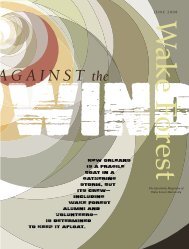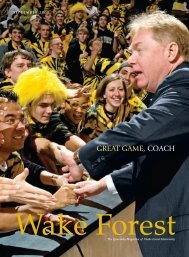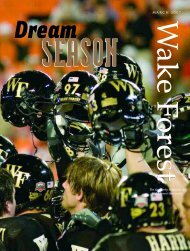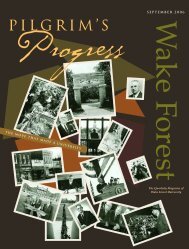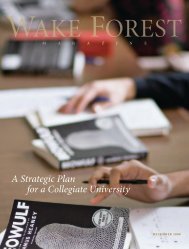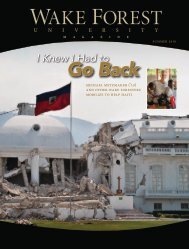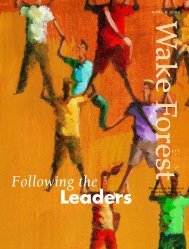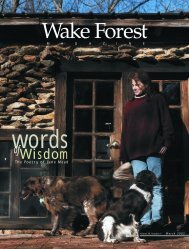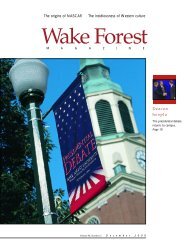Wake Forest Magazine September 2003 - Past Issues - Wake Forest ...
Wake Forest Magazine September 2003 - Past Issues - Wake Forest ...
Wake Forest Magazine September 2003 - Past Issues - Wake Forest ...
Create successful ePaper yourself
Turn your PDF publications into a flip-book with our unique Google optimized e-Paper software.
“When you decide to get yourself arrested, you agree togive up control,” he adds. “You recognize that although you’llprobably be back on the street in a few hours, a harshly punitivejudge could easily stick you behind bars for several months.”But on this particular day, the D.C. police released him andthe other activists within a few hours.The son of an ardent, New Jersey outdoorsman who loved totake his kids fishing and exploring in remote locales such asMoose Lake, Maine, John Passacantando arrived on the <strong>Wake</strong><strong>Forest</strong> campus in the fall of 1979, intent on someday becominga highly paid and prominent economist.“People aren’t stupid, you know?Way down deep, they understandthat they have an innate right toclean air, to clean water, towide-open spaces and to all theplants and animals and otherwonders to be found on thisawesome, beautiful planet.”But things didn’t work out quite the way he’d planned.For starters, he lucked out and landed an amazing part-timejob on campus—as the nighttime manager of the periodicalsroom at the Z. Smith Reynolds Library. “I don’t know how ithappened, exactly,” he recalled from his office in downtownWashington, “but I wound up with one of the greatest jobsany college kid ever had. I mean, night after night, they werepaying me to read! Can you believe it?“One of the books I loved most was Walden, and especiallythe part where he [Thoreau] keeps quoting Emerson about theneed to ‘obey thy heart,’ and to follow the sound of your owndrumbeat.That stuff really resonated with me. I think it madean impression that would eventually turn my life around.”Along with a love for reading books and magazines aroundthe clock, Passacantando found that he had a penchant for askingquestions in class. An economics major, he enjoyed it mostwhen his professors would “push us to think for ourselves,instead of simply writing down what they said and thenrepeating it back to them, in order to get an ‘A.’ After a while,I realized that I cared far less about the grade than about thequestions.”Enter Professor of Economics John C. Moorhouse, who stillteaches in the department as the Archie Carroll Professor forEthical Leadership, and who was destined to have a profoundimpact on the tall, gangly kid from Whippany, New Jersey.“Dr. Moorhouse called me into his office one day and askedme what I planned to do after graduation,” Passacantandorecalls. “I told him ‘I guess I’m going to go looking for a job.’”The professor shook his head. “I think you should go to gradschool in economics—maybe even get a Ph.D.” When thesurprised student asked why, he received a very interestinganswer. “You’re not the brightest kid in my class, and youdon’t get the best grades. But you do ask themost questions—and I hope you never stop!”Passacantando never forgot that moment.After graduating in 1983, he would go on tospend a few years as a well-paid researcher for aWall Street economics consulting firm—“Thesewere the Reagan years, and I wrote a lot of verypositive stuff about ‘supply-side economics,’believe it or not!”—before discovering that the“questions about meaning and value” in his lifewere becoming louder and more urgent witheach passing day.In the end, the canoe-and kayak-lovingPassacantando would find himself asking whythe nation’s air and water seemed to be deterioratingwith each passing year, and why the U.S.government and industry remained “essentiallyindifferent” to the rapid collapse of the ozone atmosphericlayer, with accelerating global warming as the inevitableresult.In 1993, he would take the leap that eventually led him toGreenpeace, by co-founding and then quickly building OzoneAction—a successful environmental public interest group thatmanaged to bring considerable attention to the problem ofozone depletion. Less than a decade later, when OA mergedwith Greenpeace USA in 2000,Passacantando was the naturalchoice to run the organization. A fresh-faced, thirty-nine-yearoldwunderkind, he had demonstrated a powerful ability tomanage both environmental advocates and the news media(often by bringing them together in highly visible protestdemonstrations where lots of people went to jail.)Some of the nation’s most experienced social activistsdescribe Passacantando as “smart, savvy,and empathetic—aborn leader who knows how to get the most of the peoplewho work for him.”“I spent about five years watching John run Ozone Action inthe 1990s,” said Pat Daly, a Dominican nun who now serves asexecutive director of the Tri-State Coalition for Responsible28 <strong>Wake</strong> <strong>Forest</strong> <strong>Magazine</strong>




